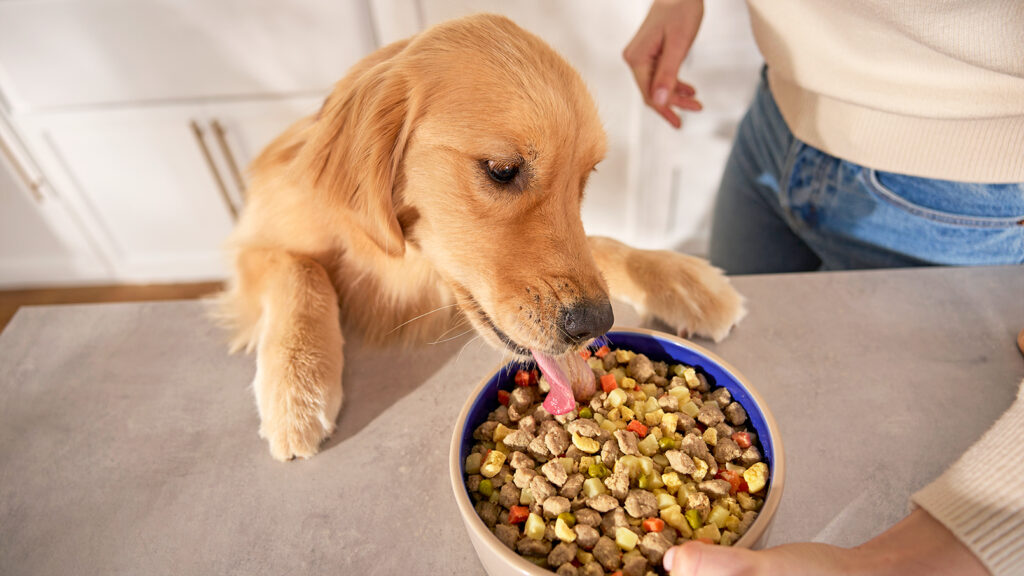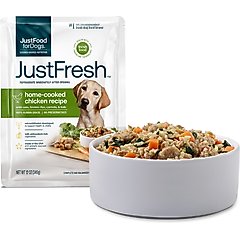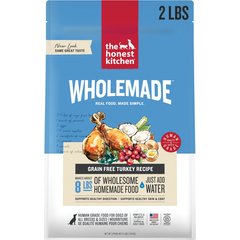What Is Fresh Dog Food? Is It Right for My Dog?

Photo by Chewy
Pet parents who want to provide their dogs with a high-quality diet sometimes question whether traditional dog foods—dry kibble or canned foods—are good choices. Some people have turned to preparing their dog’s food at home, but this can be expensive, risky, and time-consuming.
Being able to buy fresh dog foods that provide all the nutrition a dog needs to thrive is a relatively new option. But is fresh dog food right for every dog? Here’s what you should know before you purchase a fresh food diet for dogs.
Speak with your veterinarian before changing your dog’s diet.
What Should a Dog’s Diet Consist Of?
To be considered a nutritionally complete and balanced food for dogs, correct amounts of five types of nutrients must be present:
- Carbohydrates: The primary source of quickly accessible energy for dogs
- Proteins: Essential for building and maintaining muscles, skin, fur, nails, tendons, ligaments, cartilage, enzymes, hormones, antibodies, and more
- Fats: The most energy-rich nutrient, fats provide essential fatty acids and support various body functions, such as nerve impulse transmission
- Vitamins: Primarily function as enzymes necessary for normal metabolic processes
- Minerals: Contribute to structural integrity (calcium in bones, for example) and support metabolic functions
Dogs can become sick if their food provides too little or too much of any of these essential nutrients. For example, if a young Labrador Retriever eats a diet that contains too much calcium, they’re more likely to develop an orthopedic disease, such as hip dysplasia.
What Is Fresh Dog Food?
There is no official definition of what makes dog food fresh dog food, but most have the following characteristics:
- They contain few or no preservatives.
- They are made mostly from ingredients that you can find in your local grocery store, such as whole chicken or carrots.
- They are gently cooked or minimally processed, so some ingredients are still recognizable in the food.
- For the food to be complete and balanced, essential vitamins and minerals are included as supplements.
Fresh food for dogs comes in different forms: frozen, refrigerated, shelf-stable, air-dried, freeze-dried, and dehydrated.
What Are the Benefits of Fresh Food for Dogs?
Unfortunately, there hasn’t been a lot of research on fresh food for dogs, but potential benefits include:
- High digestibility: A dog’s gastrointestinal tract can easily break down and absorb the nutrients in the food.
- Reduced fecal output: High digestibility also means that there is less “stuff” left over to come out in your dog’s poop.
- Desirable flavor: Many dogs seem to love the taste of a fresh food diet for dogs, which can be especially helpful for picky eaters or dogs who are recovering from an illness or injury.
- Possible positive health effects: Feeding fresh food seems to affect the microbiome on a dog’s skin and in their gastrointestinal tract, which may help with digestion, immune function, and skin and coat health.
What Are the Downsides of Fresh Dog Food?
Fresh dog food can be a healthy and nutritious choice for many dogs. However, pet parents need to take extra precautions to avoid problems that can be associated with these types of diets.
Downsides of fresh dog food include:
- Nutritional deficiencies and excesses: Unless fresh food is only a small or occasional treat for your dog, make sure that it complies with the Association of American Feed Control Officials (AAFCO) nutritional guidelines. This information is available on the dog food label.
- Contamination with potential pathogens: Some types of fresh dog foods are at higher risk of being contaminated with disease-causing microorganisms like salmonella, campylobacter, E. coli, listeria, and Sarcocystis.
- High cost: Fresh dog food tends to be more expensive than other types of dog diets, especially kibble. Make sure you can still provide for your dog’s other needs, including unexpected veterinary care.
Is Fresh Dog Food Right for My Dog?
Many dogs do well on almost any type of high-quality, nutritionally complete and balanced dog food, but some seem to really flourish after changing to a fresh dog food.
Dogs who might benefit from a fresh food diet often have:
- A dull coat that sheds more than expected
- Dry, irritated skin
- A reduced appetite (perhaps due to pickiness)
- Stools that are especially large or a little loose
These clinical signs can also be signs of illness. Talk to your veterinarian if you have any concerns about your dog’s health and about the potential downsides and benefits of fresh food for dogs.
What Is the Best Fresh Dog Food?
The best fresh dog foods provide complete and balanced nutrition and are made by experienced, reputable companies that protect against contamination. Good options include:
- Frozen dog food: Get Real Fresh Dog Food
- Shelf-stable dog food: JustFresh by JustFoodForDogs
Recommended Product
- Dehydrated dog food: The Honest Kitchen Dehydrated Dog Food
Recommended Product
FAQs About Fresh Dog Food
Q: Do vets recommend fresh dog food?
A: Veterinarians recommend dog food based on an individual dog’s situation and needs.
A fresh food diet for dogs can be a good option as long as it provides complete and balanced nutrition and is not contaminated with potential pathogens.
Q: Can I make fresh dog food at home?
A: Making fresh dog food at home is difficult. Homemade dog food often has nutrient deficiencies and excesses that can make dogs sick. Most veterinarians do not recommend feeding homemade dog food.
Q: Is a fresh food diet for dogs better than kibble?
A: Individual dogs respond differently to various types of dog food. Many dogs thrive when eating traditional foods, but other dogs may do better on a fresh food diet for dogs. Ask your veterinarian what type of dog food would be best for your dog.
Q: Does fresh dog food need to be refrigerated?
A: Some types of fresh dog food need to be refrigerated or frozen. Other fresh dog foods are shelf-stable and can be stored at room temperature. Follow the storage recommendations printed on the dog food label.
Attributions
This content was medically reviewed by Veronica Higgs, DVM, Chewy veterinarian.






